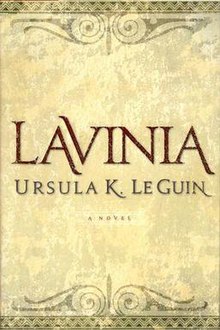
In Greco-Roman mythology, Aeneas was a Trojan hero, the son of the Trojan prince Anchises and the Greek goddess Aphrodite. His father was a first cousin of King Priam of Troy, making Aeneas a second cousin to Priam's children. He is a minor character in Greek mythology and is mentioned in Homer's Iliad. Aeneas receives full treatment in Roman mythology, most extensively in Virgil's Aeneid, where he is cast as an ancestor of Romulus and Remus. He became the first true hero of Rome. Snorri Sturluson identifies him with the Norse god Víðarr of the Æsir.

Publius Vergilius Maro, usually called Virgil or Vergil in English, was an ancient Roman poet of the Augustan period. He composed three of the most famous poems in Latin literature: the Eclogues, the Georgics, and the epic Aeneid. A number of minor poems, collected in the Appendix Vergiliana, were attributed to him in ancient times, but modern scholars consider his authorship of these poems to be dubious.
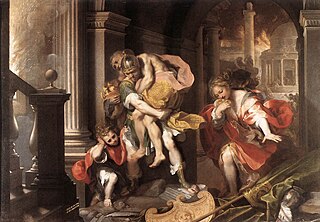
The Aeneid is a Latin epic poem that tells the legendary story of Aeneas, a Trojan who fled the fall of Troy and travelled to Italy, where he became the ancestor of the Romans. Written by the Roman poet Virgil between 29 and 19 BC, the Aeneid comprises 9,896 lines in dactylic hexameter. The first six of the poem's twelve books tell the story of Aeneas' wanderings from Troy to Italy, and the poem's second half tells of the Trojans' ultimately victorious war upon the Latins, under whose name Aeneas and his Trojan followers are destined to be subsumed.
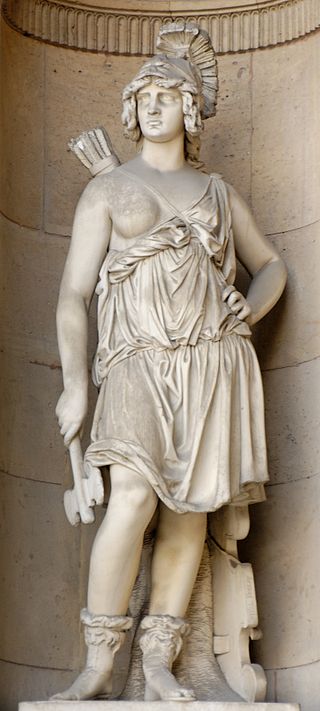
Penthesilea was an Amazonian queen in Greek mythology, the daughter of Ares and Otrera and the sister of Hippolyta, Antiope and Melanippe. She assisted Troy in the Trojan War, during which she was killed by Achilles or Neoptolemus. The asteroid 271 Penthesilea, discovered in 1887, was named in her honor.
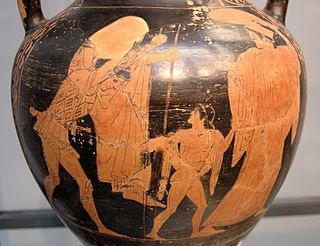
Ascanius was a legendary king of Alba Longa and is the son of the Trojan hero Aeneas and Creusa, daughter of Priam. He is a character in Roman mythology, and has a divine lineage, being the son of Aeneas, who is the son of the goddess Venus and the hero Anchises, a relative of the king Priam; thus Ascanius has divine ascendents by both parents, being descendants of god Jupiter and Dardanus. He is also an ancestor of Romulus, Remus and the Gens Julia. Together with his father, he is a major character in Virgil's Aeneid, and he is depicted as one of the founders of the Roman race.

In Roman mythology, Evander was a culture hero from Arcadia, Greece, who was said to have brought the pantheon, laws, and alphabet of Greece to ancient Italy, where he founded the city of Pallantium on the future site of Palatine Hill, Rome, sixty years before the Trojan War. He instituted the festival of the Lupercalia. Evander was deified after his death and an altar was constructed to him on the Aventine Hill.

Dido, also known as Elissa, was the legendary founder and first queen of the Phoenician city-state of Carthage, in 814 BC. In most accounts, she was the queen of the Phoenician city-state of Tyre who fled tyranny to found her own city in northwest Africa. Known only through ancient Greek and Roman sources, all of which were written well after Carthage's founding, her historicity remains uncertain. The oldest references to Dido are attributed to Timaeus, who was active around 300 BC, or about five centuries after the date given for the foundation of Carthage.
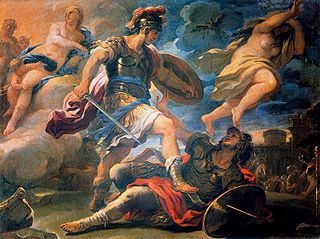
Turnus was the legendary King of the Rutuli in Roman history, and the chief antagonist of the hero Aeneas in Virgil's Aeneid.

In Roman mythology, Lavinia is the daughter of Latinus and Amata, and the last wife of Aeneas.
According to the medieval poet Jean Bodel, the Matter of Rome is the literary cycle of Greek and Roman mythology, together with episodes from the history of classical antiquity, focusing on military heroes like Alexander the Great and Julius Caesar. Bodel's division of literary cycles also included the Matter of France and the Matter of Britain. The Matter of Rome includes the Matter of Troy, consisting of romances and other texts based on the Trojan War and its legacy, including the adventures of Aeneas.
The Rutuli or Rutulians were an ancient people in Italy. The Rutuli were located in a territory whose capital was the ancient town of Ardea, located about 35 km southeast of Rome.
Lacrimae rerum is the Latin phrase for "tears of things." It derives from Book I, line 462 of the Aeneid, by Roman poet Virgil. Some recent quotations have included rerum lacrimae sunt or sunt lacrimae rerum meaning "there are tears of things."

The kings of Alba Longa, or Alban kings, were a series of legendary kings of Latium, who ruled from the ancient city of Alba Longa. In the mythic tradition of ancient Rome, they fill the 400-year gap between the settlement of Aeneas in Italy and the founding of the city of Rome by Romulus. It was this line of descent to which the Julii claimed kinship. The traditional line of the Alban kings ends with Numitor, the grandfather of Romulus and Remus. One later king, Gaius Cluilius, is mentioned by Roman historians, although his relation to the original line, if any, is unknown; and after his death, a few generations after the time of Romulus, the city was destroyed by Tullus Hostilius, the third King of Rome, and its population transferred to Alba's daughter city.

Le Roman d'Enéas is a romance of Medieval French literature, dating to c. 1160. It is written in French octosyllabic couplets totaling a little over 10,000 lines. Its subject matter is the tale of Aeneas, based on Virgil's Aeneid. It is one of the three important Romans d'Antiquité of this period; the other two are the Roman de Thèbes (anonymous) and the Roman de Troie of Benoît de Sainte-Maure.

The Cumaean Sibyl was the priestess presiding over the Apollonian oracle at Cumae, a Greek colony near Naples, Italy. The word sibyl comes from the ancient Greek word sibylla, meaning prophetess. There were many sibyls throughout the ancient world. Because of the importance of the Cumaean Sibyl in the legends of early Rome as codified in Virgil's Aeneid VI, and because of her proximity to Rome, the Cumaean Sibyl became the most famous among the Romans. The Erythraean Sibyl from modern-day Turkey was famed among Greeks, as was the oldest Hellenic oracle, the Sibyl of Dodona, dating to the second millennium BC according to Herodotus, favored in the east.
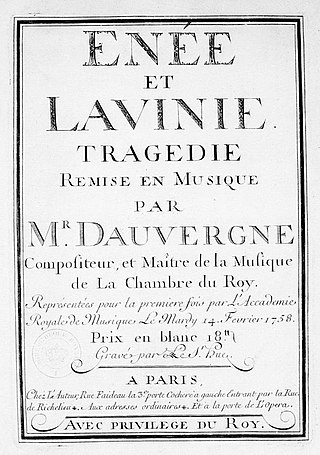
Énée et Lavinie is an opera by the French composer Antoine Dauvergne, first performed at the Académie Royale de Musique on 14 February 1758. It takes the form of a tragédie lyrique in five acts.
Énée et Lavinie is an opera by the French composer Pascal Collasse, first performed at the Académie Royale de Musique on 7 November 1690. It takes the form of a tragédie lyrique in a prologue and five acts.
The Aeneid has been analyzed by scholars of several different generations and schools of thought to try to determine the political commentary that Virgil had hoped to portray. The major schools of thought include the overarching idea that Virgil had written a story that parallels Roman history at the time it was written as well as messages both in support of and against the rule of Augustus Caesar. Finally, it has been argued that Virgil had a stance on geopolitics which he conveys in the actions of Aeneas and his crew.

Eneida is a Ukrainian burlesque poem, written by Ivan Kotliarevsky in 1798. This mock-heroic poem is considered to be the first literary work published wholly in the modern Ukrainian language. Although Ukrainian was an everyday language to millions of people in Ukraine, it was officially discouraged from literary use in the area controlled by Imperial Russia.
Eneide is a seven-episode 1971–1972 Italian television drama, adapted by Franco Rossi from Virgil's epic poem the Aeneid. It stars Giulio Brogi as Aeneas and Olga Karlatos as Dido, and also stars Alessandro Haber, Andrea Giordana and Marilù Tolo. RAI originally broadcast the hour-long episodes from 19 December 1971 to 30 January 1972. A shorter theatrical version was released in 1974 as Le avventure di Enea.
